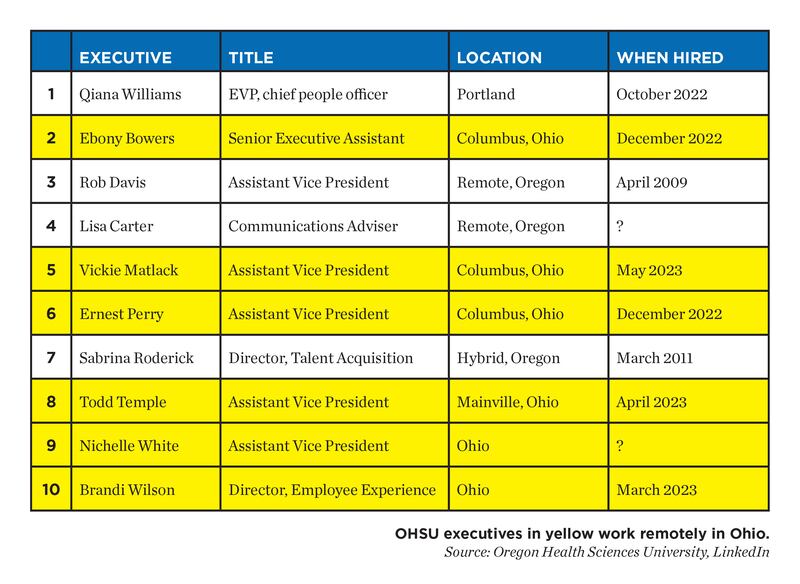In April 2021, Oregon Health & Science University paid $585,000 to settle complaints that it didn’t adequately protect a victim of “TikTok Doc” Jason Campbell, who sent the woman a dick pic and crept up to press his erection against her.
Eight months later, former U.S. Attorney General Eric Holder completed a 51-page report on the incident and others like it, determining that OHSU’s human resources department was “devalued and marginalized” and didn’t have enough resources to investigate misconduct.
Among Holder’s recommendations: conduct a “rigorous, competitive, and nationwide search for a highly qualified” head of HR and increase diversity within the HR department.
Given the composition of the top brass at OHSU’s human resources department two years later, you’d think that Holder had also recommended hiring more people from Ohio, specifically.
Right now, seven of the 10 top people in the department come from the Buckeye State, and six of those executives work remotely from there. All are former employees of OhioHealth, a network of 15 hospitals based in Columbus. The hirings mean that OHSU, a recipient of state funding, is sending a chunk of money from Oregon taxpayers to Ohio.
Pill Hill’s zest for Ohio began after OHSU hired Qiana Williams, an eight-year veteran of OhioHealth, as executive vice president and chief people officer. Williams worked as chief diversity and inclusion officer at OhioHealth and became vice president of human resource operations. Before that, she was vice president of talent acquisition at Huntington National Bank.
Williams joined OHSU in October 2022 and makes $550,000 a year. (In addition to her day job, Williams is also an author. In January, she published The Lie: An Enchanted Revelation: A Fairytale of Finding Your Voice in a Forest of Fables.)
Unlike most of her top staff, Williams moved to Portland to take the job at OHSU. Among the telecommuters are: Brandi Wilson, director of employee experience; Nichelle White, assistant vice president for talent management; Todd Temple, assistant vice president for total rewards (employee compensation in all forms); and Ebony Bowers, senior executive assistant.

OHSU spokeswoman Sara Hottman says all the jobs were posted publicly before the hires were made and that 81% of the university’s HR managers above the director level are based in Portland.
In a statement emailed to WW, Williams says she asked OHSU employees what they wanted from the HR department during a bike tour around campus and at “coffee with Qiana” meetings.
“I have built, and continue to build, a knowledgeable team that reflects the values and goals my new OHSU colleagues told me were important to them,” Williams says. “Those priorities include taking a number of steps to pay employees fairly and competitively, which supports efforts to recruit and retain staff in the face of ongoing workforce challenges.”
She defended her Ohio hires, saying she has “a forward-thinking remote work policy that has given OHSU access to a much larger pool of talent in our efforts to recruit and retain employees.”
Cory Mlady, senior recruiter for human resources at Boly:Welch in Portland, says there are lots of reasons Williams may have gone back to Ohio for the hires. He recalls seeing postings from OHSU that emphasized union experience, which can be hard to come by in Portland because the city has few large employers with unionized workforces, like OHSU’s.
“It’s a pretty small pool of people that practice in a union environment,” Mlady says.
That said, the preponderance of telecommuters in Williams’ inner circle means OHSU is bucking a back-to-work trend nationwide, especially among HR executives, Mlady says. “We’ve noticed a shift, especially in HR, to have the workforce in person.”
It hasn’t been smooth sailing for the Ohioans. Since Williams arrived, her department has been at the center of two employment fiascos. In September, OHSU said it planned to hand out $12.5 million in bonuses—not based on merit—to non-union administrators.
The university’s top executives, including Williams, were set to get the biggest handouts: 15.9% of their already large salaries. Unionized employees protested, sending around a petition asking executive vice presidents to refuse the bonuses. In the end, OHSU excluded the top brass.
In October, the university sent staffers an email telling them that health benefits for their domestic partners and children would be discontinued at year end. OHSU president Danny Jacobs reversed that position on the same day, blaming it on the Employee Benefits Council, a group that advises the administration.
Correction: An earlier version of this story said that Qiana Williams received a bonus of $87,450 last year. She was set to receive that amount before OHSU canceled President’s Recognition Award bonuses for executive vice presidents. WW regrets the error.
